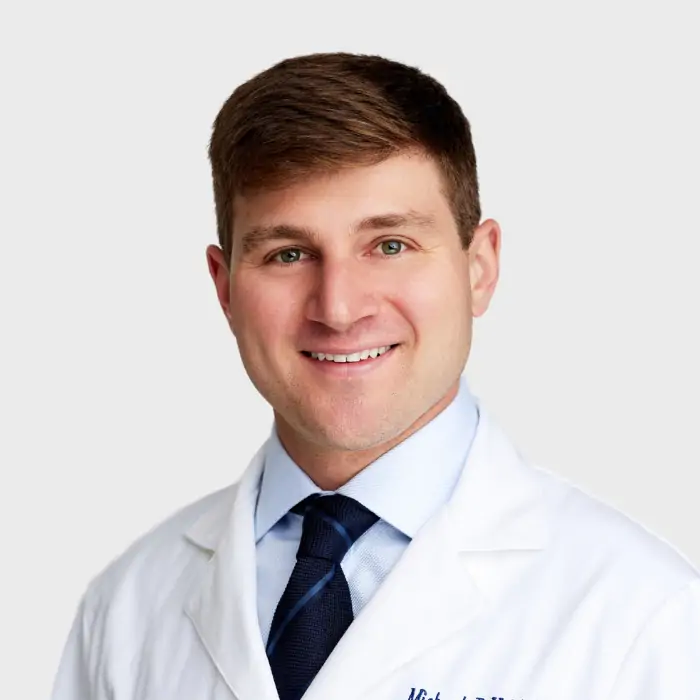Expert Knee Replacement Surgeons in Fairfield & Westchester Counties
At Orthopaedic & Neurosurgery Specialists (ONS), our board-certified, fellowship-trained knee replacement surgeons are experts in knee replacement surgery and recovery, offering advanced solutions including minimally invasive knee replacement surgery, robotic-assisted knee replacement surgery, and same-day knee replacement. With convenient locations across Greenwich Stamford, Wilton, Danbury, and Harrison, we provide personalized orthopedic care for patients throughout Fairfield and Westchester counties in Connecticut and New York.
Whether you’re dealing with arthritis, a knee injury, or other joint-related conditions, our experts are dedicated to restoring your mobility and improving your overall quality of life. From your initial evaluation to post-surgery care, we provide a seamless, personalized approach to ensure a smooth recovery and optimal long-term results. At ONS, we prioritize your well-being every step of the way, offering the expertise, guidance, and support you need for a successful knee replacement recovery.
Why Choose Orthopaedic & Neurosurgery Specialists (ONS) for Knee Replacement Surgery?
At ONS, we’ve been performing hip replacement surgeries for over 25 years. In addition to providing world-class surgical care, we take great pride in our approach to hip replacement recovery, providing the guidance and resources necessary to help you heal well.
- Fellowship-Trained Surgeons: Our team has advanced fellowship training dedicated to knee surgery and knee replacement recovery, ensuring the best outcomes. Our fellowship-trained knee surgeons perform hundreds of knee replacement surgeries per year. We have outstanding outcomes with low complication rates.
- Minimally Invasive & Robotic Surgery: Our surgeons use advanced techniques to reduce recovery time and improve your knee replacement recovery experience.
- Comprehensive Recovery Plans: We ensure that our patients understand what to expect after knee replacement surgery and help guide you through every stage of your recovery, from pain management to physical therapy.
What to Know About Knee Replacement Surgery
Knee replacement surgery is a common and highly-successful orthopedic treatment for severe knee pain and arthritis. During knee replacement surgery, your orthopedic surgeon will resurface the damaged knee with artificial components. The procedure helps restore mobility and relieve severe pain from osteoarthritis and other conditions that lead to degeneration and a loss of cartilage. Not everyone needs surgery to treat their injured knee, but for those who do, there are multiple options available.
Types of Knee Replacement Surgery
During knee replacement surgery, your orthopedic surgeon will resurface the damaged knee with artificial components. Depending on the extent of the knee joint damage, your surgeon will recommend the best approach for your knee replacement surgery:
• Total Knee Replacement: Replaces the entire knee joint with a prosthetic. Total replacement surgery is the more common procedure, as most patients have diffuse arthritis throughout the knee.
• Partial Knee Replacement: Involves replacing only the damaged part of the knee joint.
• Outpatient Knee Replacement Surgery: In some cases, patients can return home the same day.
Which Conditions Are Improved with Knee Replacement Surgery?
Most people require knee replacement surgery due to arthritis or other degenerative joint conditions. If non-surgical treatments like medications and physical therapy no longer provide relief, surgery may be necessary to restore mobility and relieve pain.
- The most common reason to undergo knee replacement surgery is degenerative osteoarthritis, which is the most common form of arthritis. It is caused by wear and tear and causes joint pain, stiffness and inflammation. It is most common among adults, with an increasing incidence with older age.
- Other conditions can also lead to chronic degenerative changes in the knee, including a history of major trauma, inflammatory (autoimmune) arthritis, or certain genetic conditions.
Who is a Good Candidate for Knee Replacement Surgery?
You may be a good candidate for knee replacement surgery if:
• You have severe knee pain and damage due to arthritis or injury.
• You have discomfort, stiffness and swelling to the point where everyday activities such as walking, climbing stairs, and standing up are painful and difficult.
• You have continued symptoms despite appropriate conservative treatments like physical therapy, medications, injections, or other surgical procedures.
Knee Replacement Recovery: What to Expect
Recovery after knee replacement surgery is a key part of your healing process. Here’s an overview of what to expect during your knee replacement recovery journey:
• Hospital Stay or Same-Day Discharge: Depending on your overall health, social support, and motivation, you may either be discharged the same day (outpatient surgery) or stay overnight for observation.
• Physical Therapy: This is essential for a successful recovery. Most patients start physical therapy at home within the first few days after surgery, followed by outpatient physical therapy for 4 to 8 weeks, though some may need less.
• Driving and Return to Work: Recovery timelines for driving and returning to work vary depending on your pain levels, functional progress, and job requirements. You’ll need to stop taking narcotic pain medications and ensure that you can safely and quickly brake in an emergency. Many patients are ready to drive between 2 and 4 weeks post-surgery.
By adhering to your recovery plan and staying proactive, you can optimize your healing and regain mobility, allowing you to return to the activities you enjoy. The recovery plan for knee replacement surgery may include:
• Physical Therapy: Regular sessions to restore mobility, strength, and flexibility.
• Activity Modification: Limiting or modifying activities to avoid stress on the knee while it heals.
• Assistive Devices: Temporary use of a walker, cane, or crutches to aid mobility.
• Cold Therapy: Using ice packs, gel packs, or an ice machine to help reduce swelling and inflammation.
• Pain and Swelling Management: We use a multimodal approach to pain control that minimizes or eliminates the need for opioids. Some patients may experience a narcotic-free recovery.
By adhering to your recovery plan and staying proactive, you can optimize your healing and regain mobility, allowing you to return to the activities you enjoy.
During knee replacement surgery, your orthopedic surgeon will resurface the damaged knee with artificial components. Depending on the extent of the knee joint damage, your surgeon will recommend the best approach for your knee replacement surgery:
• Total Knee Replacement: Replaces the entire knee joint with a prosthetic. Total replacement surgery is the more common procedure, as most patients have diffuse arthritis throughout the knee.
• Partial Knee Replacement: Involves replacing only the damaged part of the knee joint.
• Outpatient Knee Replacement Surgery: In some cases, patients can return home the same day.
Most people require knee replacement surgery due to arthritis or other degenerative joint conditions. If non-surgical treatments like medications and physical therapy no longer provide relief, surgery may be necessary to restore mobility and relieve pain.
- The most common reason to undergo knee replacement surgery is degenerative osteoarthritis, which is the most common form of arthritis. It is caused by wear and tear and causes joint pain, stiffness and inflammation. It is most common among adults, with an increasing incidence with older age.
- Other conditions can also lead to chronic degenerative changes in the knee, including a history of major trauma, inflammatory (autoimmune) arthritis, or certain genetic conditions.
You may be a good candidate for knee replacement surgery if:
• You have severe knee pain and damage due to arthritis or injury.
• You have discomfort, stiffness and swelling to the point where everyday activities such as walking, climbing stairs, and standing up are painful and difficult.
• You have continued symptoms despite appropriate conservative treatments like physical therapy, medications, injections, or other surgical procedures.
Recovery after knee replacement surgery is a key part of your healing process. Here’s an overview of what to expect during your knee replacement recovery journey:
• Hospital Stay or Same-Day Discharge: Depending on your overall health, social support, and motivation, you may either be discharged the same day (outpatient surgery) or stay overnight for observation.
• Physical Therapy: This is essential for a successful recovery. Most patients start physical therapy at home within the first few days after surgery, followed by outpatient physical therapy for 4 to 8 weeks, though some may need less.
• Driving and Return to Work: Recovery timelines for driving and returning to work vary depending on your pain levels, functional progress, and job requirements. You’ll need to stop taking narcotic pain medications and ensure that you can safely and quickly brake in an emergency. Many patients are ready to drive between 2 and 4 weeks post-surgery.
By adhering to your recovery plan and staying proactive, you can optimize your healing and regain mobility, allowing you to return to the activities you enjoy. The recovery plan for knee replacement surgery may include:
• Physical Therapy: Regular sessions to restore mobility, strength, and flexibility.
• Activity Modification: Limiting or modifying activities to avoid stress on the knee while it heals.
• Assistive Devices: Temporary use of a walker, cane, or crutches to aid mobility.
• Cold Therapy: Using ice packs, gel packs, or an ice machine to help reduce swelling and inflammation.
• Pain and Swelling Management: We use a multimodal approach to pain control that minimizes or eliminates the need for opioids. Some patients may experience a narcotic-free recovery.
By adhering to your recovery plan and staying proactive, you can optimize your healing and regain mobility, allowing you to return to the activities you enjoy.
Featured Videos
Benefits of Joint Replacement at Stamford ASC
Who is a Candidate for Outpatient Joint Replacement Surgery?
ONS Provides Consistency of Care
Physicians
 Co-Director of the ONS Outpatient Joint Replacement Center
Co-Director of the ONS Outpatient Joint Replacement Center- Hip and Knee Replacement
Practicing in:
Greenwich and Wilton Co-Director, ONS Outpatient Joint Replacement Center; Director of Joint Replacement, GH
Co-Director, ONS Outpatient Joint Replacement Center; Director of Joint Replacement, GH- Hip and Knee Replacement
Practicing in:
Greenwich, Harrison, and Stamford
- Sports Medicine
- Shoulder
Practicing in:
Greenwich and Stamford Medical Director, Orthopedic Trauma, Greenwich Hospital
Medical Director, Orthopedic Trauma, Greenwich Hospital- Hip and Knee Replacement
Practicing in:
Wilton, Greenwich, and Stamford
- Sports Medicine
- Shoulder
Practicing in:
Greenwich, Wilton, and Stamford